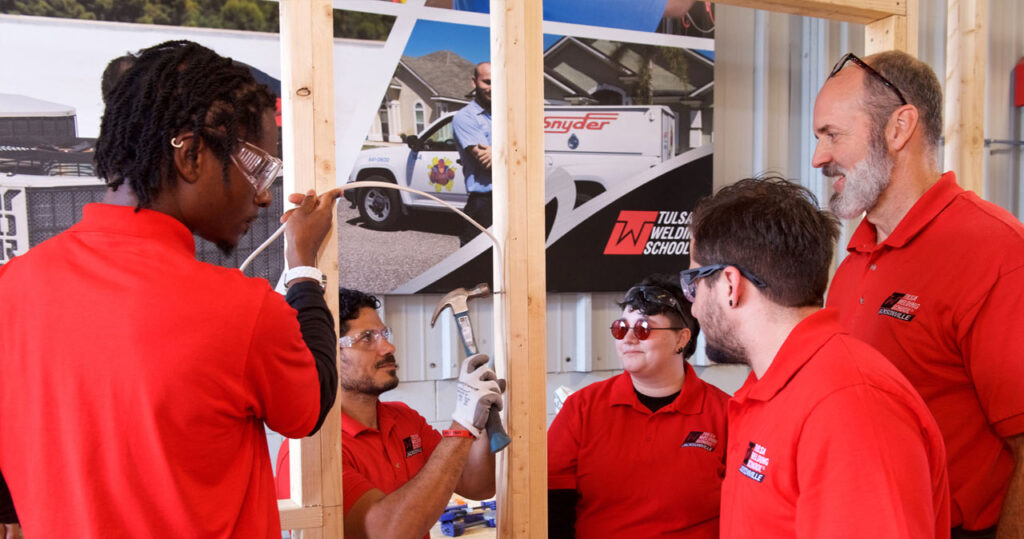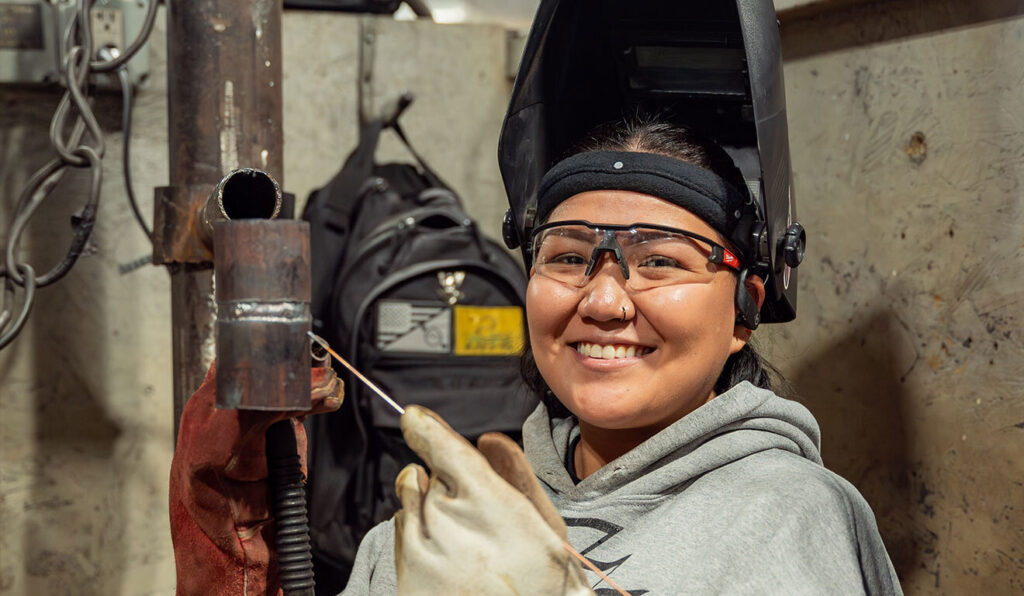Planning for your future in the skilled trades starts with knowing how to make it happen. With employers increasingly looking to hire those with technical training, trade school can be a crucial step on the path to becoming a welder, pipefitter, HVAC/R technician, maintenance technician or electrician.1
But how much is tuition at TWS?
Are there ways to save on tuition and fees?
What funding options are available?
We know you need answers. That’s why TWS is transparent about costs. We give you the information you need upfront, so you can make an informed decision about this important investment—perhaps the first of many you’ll make throughout your life.
Below are estimates for TWS tuition and fees for the 2023-2024 academic year.
Trade school can cost less than these other common investments, but how else does it compare? Learn more about the value of trade school.

Estimate Your Actual Costs
How much could financial aid lower the cost of your investment in trade school? Use our net training cost calculators to find out.
Tuition and Costs by Program
Effective for all enrollments after 5/1/2025 – 9/30/2025 (24/25 and 25/26 Award Years)
Whether you’re planning on becoming a welder, pipefitter, HVAC/R technician, maintenance technician or electrician, TWS has a program for you. The cost of your specific training investment can depend on the vocational program you choose and your eligibility for scholarships, grants and other financial aid funding*.
| Electrical Applications | Electrical Technologies | Electrical Lineworker | Refrigeration Technologies | Electro-Mechanical technologies | AOS/AAS Upper Division | Professional Welder | Welding Specialist with Pipefitting | Advanced Industrial Maintenance Technology | |
|---|---|---|---|---|---|---|---|---|---|
| Tuition: | $ 17,400 | $ 17,400 | $ 16,900 | $ 18,400 | $ 22,000 | $ 18,000 | $ 19,200 | $ 23,512 | $ 18,000 |
| Per Semester Credit Hour Tuition: | $ 621.43 | $ 621.43 | $ 1,024.24 | $ 657.14 | $ 611.11 | $ 514.29 | $ 768 | $ 701.85 | $ 2,571.43 |
| Military Pricing Tuition:* | $ 15,660 | $ 15,660 | $ 15,210 | $ 16,560 | $ 19,800 | $ 16,200 | $ 17,280 | $ 21,161 | $ 16,200 |
| Per Semester Credit Hour Military Pricing Tuition:* | $ 559.29 | $ 559.29 | $ 921.82 | $ 591.43 | $ 550 | $ 462.86 | $ 691.20 | $ 631.67 | $ 2,314.29 |
| Course Materials / Textbooks: | $ 1,700 | $ 1,700 | $ 300 | $ 1000 | $ 1,600 | $ 2,900 | $ 350 | $ 394 | $ 1,028 |
| Lab Fee | $ 2,000 | $ 2,000 | $ 1,000 | $ 2,000 | $ 2,000 | $ 1,400 | $ 2,000 | $ 2,300 | |
| Gear Package: | $ 1,800 | $ 1,800 | $ 3,600 | $ 1,800 | $ 1,800 | $ 600 | $ 1,800 | $ 2,600 | $ 672 |
| Accident Insurance: | $ 100 | $ 100 | $ 300 | $ 100 | $ 100 | $ 300 | $ 300 | $ 300 | $ 150 |
| Technology Fee: | $ 500 | $ 500 | $ 500 | $ 500 | $ 500 | $ 500 | $ 500 | ||
| Registration Fee** | $ 25 | $ 25 | $ 100 | $ 25 | $ 25 | $ 25 | $ 25 | $ 50 | $ 25 |
| Total Program Cost: | $ 23,525 | $ 23,525 | $ 22,200 | $ 23,825 | $ 28,025 | $ 23,725 | $ 24,175 | $ 29,656 | $ 19,875 |
| Total MTP Program Cost: | $ 21,785 | $ 21,785 | $ 20,510 | $ 21,985 | $ 25,825 | $ 21,925 | $ 22,255 | $ 27,305 | $ 18,075 |
*Military Pricing (MTP) is 90% of Tuition Price
**Due at time of enrollment
Cost of Attendance Chart
The Cost of Attendance chart reflects estimated costs for non-institutional charges a student may experience while attending our institutions. These are derived based on average costs in the area identified from the most recent years’ Consumer Expenditure Survey (CES), produced by the U.S. Bureau of Labor Statistics.
25/26 and 26/27 Monthly Cost of Attendance Budget Amounts
With Parents per month
| Houston | Jacksonville | Tulsa | Dallas Metro | Atlanta Metro | |
|---|---|---|---|---|---|
| Living Expenses | $ 1,069.03 | $ 1,069.03 | $ 1,058.46 | $ 1,090.21 | $ 1,079.64 |
| Travel | $ 335.02 | $ 335.02 | $ 331.71 | $ 341.66 | $ 338.35 |
| Personal | $ 639.59 | $ 639.59 | $ 633.27 | $ 652.26 | $ 645.94 |
| Total: | $ 2,043.64 | $ 2,043.64 | $ 2,023.44 | $ 2,084.13 | $2,063.92 |
Off-Campus per month
| Houston | Jacksonville | Tulsa | Dallas Metro | Atlanta Metro | |
|---|---|---|---|---|---|
| Living Expenses | $ 1,644.66 | $ 1,644.66 | $ 1,628.40 | $ 1,677.24 | $ 1,660.98 |
| Travel | $ 335.02 | $ 335.02 | $ 331.71 | $ 341.66 | $ 338.35 |
| Personal | $ 1,065.98 | $ 1,065.98 | $ 1,055.44 | $ 1,087.10 | $ 1,076.56 |
| Total: | $ 3,045.67 | $ 3,045.67 | $ 3,015.56 | $ 3,106.00 | $ 3,075.89 |

Experience our Virtual Tour now!
Take a virtual tour of our campuses in Tulsa, OK, Jacksonville, FL, Houston, TX, and the Dallas Metro, TX. Offering trade school programs in welding, HVAC/refrigeration, electrical & industrial maintenance.

Ways to Save on Your Trade School Investment
Did you know there is funding for technical training that doesn’t have to be paid back?*
Typically, such funding can be available to Tulsa Welding School students as they progress in their classes.
Federal Grants
Federal grants are often called “gift aid” because they don’t have to be repaid once you complete the program, grants are typically awarded based on financial need.i
Scholarships
Scholarships are another form of “gift aid”, but they’re usually merit-based. This means students must meet certain qualifications in order to be considered for an award.i
Military Benefits
Funding to help with the cost of trade school is available to active duty, reserve and veterans under the Post-9/11 GI Bill®, Reserve GI Bill and Montgomery GI Bill (MGIB).ii

Questions? We’re Here to Help
Reviewing tuition and fee figures can give you an idea of how much your investment in technical training may cost, but it’s important to remember that financial aid could help offset these expenses. Our Student Financial Services representatives are standing by to answer your questions about tuition and if you qualify for funding.
*Financial aid available to those who qualify.
**Scholarships available to those who qualify.

